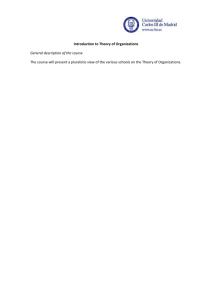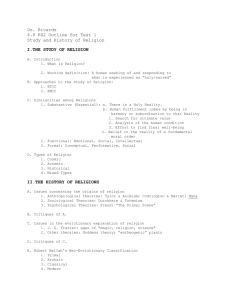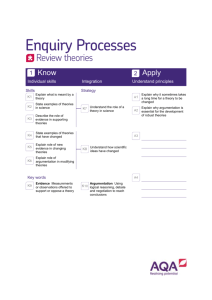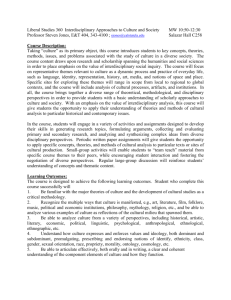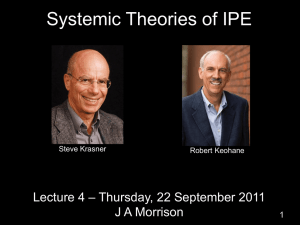Theories of International Relations and Foreign Policy Analysis
advertisement
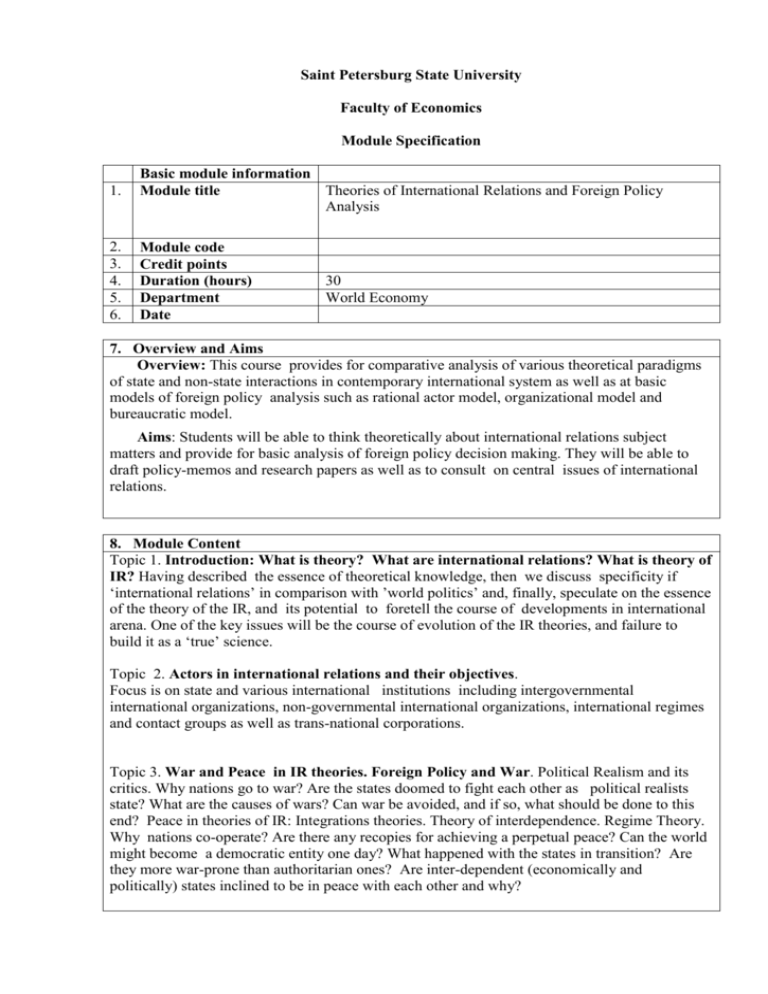
Saint Petersburg State University Faculty of Economics Module Specification 1. Basic module information Theories of International Relations and Foreign Policy Module title Analysis 2. 3. 4. 5. 6. Module code Credit points Duration (hours) Department Date 30 World Economy 7. Overview and Aims Overview: This course provides for comparative analysis of various theoretical paradigms of state and non-state interactions in contemporary international system as well as at basic models of foreign policy analysis such as rational actor model, organizational model and bureaucratic model. Aims: Students will be able to think theoretically about international relations subject matters and provide for basic analysis of foreign policy decision making. They will be able to draft policy-memos and research papers as well as to consult on central issues of international relations. 8. Module Content Topic 1. Introduction: What is theory? What are international relations? What is theory of IR? Having described the essence of theoretical knowledge, then we discuss specificity if ‘international relations’ in comparison with ’world politics’ and, finally, speculate on the essence of the theory of the IR, and its potential to foretell the course of developments in international arena. One of the key issues will be the course of evolution of the IR theories, and failure to build it as a ‘true’ science. Topic 2. Actors in international relations and their objectives. Focus is on state and various international institutions including intergovernmental international organizations, non-governmental international organizations, international regimes and contact groups as well as trans-national corporations. Topic 3. War and Peace in IR theories. Foreign Policy and War. Political Realism and its critics. Why nations go to war? Are the states doomed to fight each other as political realists state? What are the causes of wars? Can war be avoided, and if so, what should be done to this end? Peace in theories of IR: Integrations theories. Theory of interdependence. Regime Theory. Why nations co-operate? Are there any recopies for achieving a perpetual peace? Can the world might become a democratic entity one day? What happened with the states in transition? Are they more war-prone than authoritarian ones? Are inter-dependent (economically and politically) states inclined to be in peace with each other and why? 2 Topic 4. Economics in International Relations. Mercantilism and Liberalism. Liberalism and Security. “Hegemonic Stability” Theory. World-System Theory. The saying goes that Mercury always plays a stronger role that Mars. How market economy contributes to peace and security? Pan-Britanica and pan-Americana as ‘hegemonic stability’ case-studies. Role of semi-periphery in the world-system theory Topic 5. Foreign Policy Analysis. Levels-of-Analysis Problem. Groups of Interest, Elites and Foreign Policy Making. Models of Analysis: RAM, Organizational Model and Bureaucratic Models. 9. Indicative Reading Basic literature Keohane Robert (ed.) Neorealism and its critics. Columbia University Press, 1986 Vasques, John A. The War Puzzle. Cambridge University Press, 1997 Stein, Arthur A. Why Nations Cooperate. Circumstance and Choice in International Relations. Cornell University Press Craig, Gordon A. and George, Alexander L. Force and Statecraft. Diplomatic Problems of Our Time. Oxford University Press, 1983 Allison, Graham and Zelikow, Philip. Essence of Decision. Explaining the Cuban Missile Crisis. Second Edition, Longman, 1999 Morgenthau Hans. Politics Among Nations. 1948, New York: Knopf Carr Edward H. The Twenty Years’ Crises, 1918-1939. An Introduction to the Study of International Relations. 4th ed. New York, 1964 Валлерстайн И. Анализ мировых систем и ситуация в современном мире. СПб., 2001 Additional literature Ломагин Н.А. (ред.) Введение в теорию международных отношений и анализ внешней политики. СПб, 2001 Understandings of Russian Foreign Policy. Ed. by Ted Hopf. The Pennsylvania State University Press, 1999, p.211-250 10. Learning outcomes Knowledge and understanding. After studying this module students should be able to: - know contemporary IR theories, their scope and analytical potential; - grasp the logic of development of IR theories; - understand dominant methods and models of foreign policy analysis; - Special attention will be given to EU-Russia energy dialogue as well as to energy policy of the former Soviet states. Students will analyze the current developments in the energy sector from political, economic, legal, and environmental angles. Skills, qualities and attributes. After studying this module students should be able to: - analyze the current foreign policy developments and international relations theoretically; - imply key methods and models of foreign policy analysis to on-going foreign policy of 3 most important states and international institutions; grasp the role of the WTO in the emerging energy governance debate; draft policy-memos and research papers as well as to consult on central issues of international relations. - formulate and defend with solid arguments their own point of view in oral and written discussions - 11. Teaching and learning Range of modes of direct contact This indicates the range of direct contact teaching and learning methods used on this module, e.g. lectures, seminars lectures, seminars, group presentations, in-class discussions, in-class written assignments Total contact hours Range of other learning methods This indicates the range of other teaching and learning methods used on this module, e.g. directed reading, research preparation of presentations, pre-readings, home written assignments Total non-contact hours 12. Indicative Reading Assessment methods This indicates the type and weighting of assessment elements of the module Weighting Type Description 25% Essay Essay on one of 10 basic themes from Topics 1-5. 50% In-class Participation in discussions, and case-study presentations during work classes, in-class written assignments 25% Test Final writing multiple choice test Diagnostic/formative assessment This indicates if there are any assessments that do not contribute directly to the final module Further information on assessment This section provides further information on the module’s assessment where appropriate


